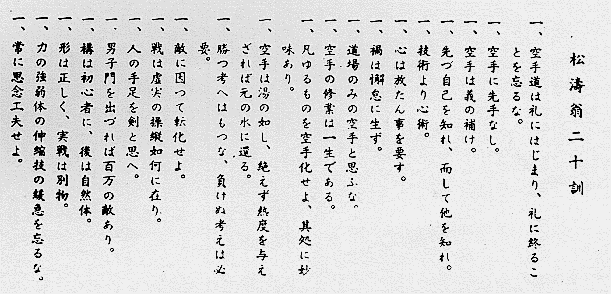Karate stands on the side of justice
空手は義の補け

This is the third in a series of posts to examine Shotokan’s niju kun, Gichin Funakoshi’s list of 20 guiding principles for karate.

The third principle is:
空手は義の補け
In Romaji:
Karate wa, gi no tasuke.
In English, I think the best translation is:
Karate stands on the side of justice.
There’s no hidden meaning here. Karate (and those who practice it) should always do the right thing and encourage others to do the same. But doing the right thing can be hard, especially when it’s bound to be uncomfortable.
Take, for example, the age-old trap: “Does this dress make me look fat?”
- Justice dictates that the dress should be held blameless.
- But prudence suggests that the dress has no feelings to hurt.
- And wisdom demands that you challenge the snuck premise. 😉
I’m not suggesting that Funakoshi is talking about situations this trivial, but it’s a good example of the kind of situation where the right answer is not always the best answer.
Returning to standing on the side of justice, Funakoshi is giving us a good news/bad news message:
- The bad news is that we’re sometimes going to be obligated to do the “just” thing, even if we really don’t want to, and that’s going to require strength.
- The good news is that our karate training should give us the physical, mental, and moral strength to succeed.
In Karate-do Kyohan, as part of his explanation of the meaning of “Kara” (空), Funakoshi says:
He who would study Karate-do must always strive to be inwardly humble and outwardly gentle. However, once he has decided to stand up for the cause of justice, then he must have the courage expressed in the saying, “Even if it must be ten million foes, I go!”
The problem, of course, is that people often disagree about what constitutes “justice”, and sometimes they’re not even close. Take Nakasone, for example. His interpretation of the niju kun, published in 1938, includes the following:
Our Imperial army is powerful because it believes firmly in defeating injustice in the name of god… We can crash our planes into our enemy’s fuel depots. Our strength comes from the belief that we stand for justice.
On one hand, the Japanese army was up to some unsavory shenanigans during this period and, even if they weren’t, extolling the “courage” required to fly planes into buildings hasn’t aged well.
On the other hand, that whole paragraph really sticks out like a sore thumb in the middle of a discussion of karate ethics. It sounds more like something that would come out of a propaganda ministry … but Funakoshi endorsed it. 🤷
Fortunately, Nakasone brings it back to karate at the end of his interpretation, where he explains that because karate can be used as a deadly weapon, it should be used only in the furtherance of justice.
Personally, I tend to summarize it in two parts:
- Karate builds strength (physical, mental, and moral) and the strong have an obligation to encourage justice.
- Karate, itself, should only be used when the alternative would allow a grave injustice.